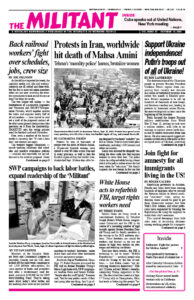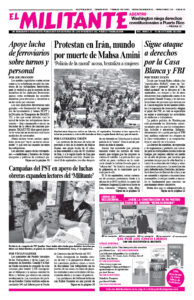October 13, 1997
SYDNEY — On September 8 coal miners at Rio Tinto’s Hunter Valley #1 mine resumed strike action after the company suspended two workers for refusing to transfer from their usual jobs to work in the coal preparation plant. The strike resumed two days before the end of a seven-week negotiation period which had not resolved the conflict.
Since 1993 Rio Tinto has campaigned to have all employees on nonunion individual contracts, and has successfully eroded union coverage at its vast iron ore, diamond, gold, bauxite, and aluminum smelting interests.
The strike at Hunter Valley #1 mine is the company’s opening shot in their war to break the Construction, Forestry, Mining and Energy Union in the coal industry. Only seven union members have signed nonunion individual contracts. The remaining 430 miners have no intention of giving up hard-won gains.
October 13, 1972
The release of three U.S. prisoners of war on by the Democratic Republic of Vietnam has exposed the Nixon administration’s lack of concern with U.S. servicemen held prisoners. All three were pilots shot down over Vietnam.
Previous prisoners released by the Vietnamese have been taken into military custody and “debriefed” on the Indochina war. In several instances prisoners who went into this custody as opponents of the war emerged as supporters of it. Antiwar statements by the released pilots pose a threat to the government’s pro-war propaganda. When they arrived in New York they were immediately taken away by the military.
Despite the administration’s crocodile tears about the POWs, the government is more concerned with denying them their constitutional rights to free speech and “recapturing” them than freeing them.
October 13, 1947
CLEVELAND — One independent labor candidate qualified for a place on the ballot as a council candidate in November’s elections and two others missed out by narrow margins in last Tuesday’s primary elections.
Eight union men ran for City Council in the 33 council races. Four ran as independent labor candidates. Four designated themselves as Democratic or Independent Democratic. All four running as Democrats failed to qualify. No union candidate received official Democratic Party endorsement or support. All eight had to organize and finance their campaigns without aid of any established party machine.
Cleveland’s primaries were of national significance because they furnished instructive examples of a variety of labor election tactics and policies that will likely be repeated on a broad scale throughout the country.

